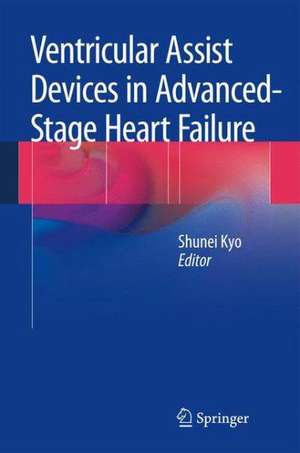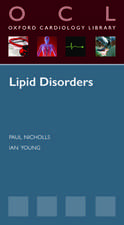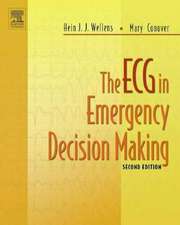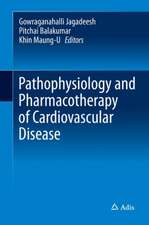Ventricular Assist Devices in Advanced-Stage Heart Failure
Editat de Shunei Kyoen Limba Engleză Hardback – 9 dec 2013
| Toate formatele și edițiile | Preț | Express |
|---|---|---|
| Paperback (1) | 708.23 lei 6-8 săpt. | |
| Springer – 23 aug 2016 | 708.23 lei 6-8 săpt. | |
| Hardback (1) | 716.28 lei 6-8 săpt. | |
| Springer – 9 dec 2013 | 716.28 lei 6-8 săpt. |
Preț: 716.28 lei
Preț vechi: 753.97 lei
-5% Nou
Puncte Express: 1074
Preț estimativ în valută:
137.08€ • 141.61$ • 114.08£
137.08€ • 141.61$ • 114.08£
Carte tipărită la comandă
Livrare economică 25 martie-08 aprilie
Preluare comenzi: 021 569.72.76
Specificații
ISBN-13: 9784431544654
ISBN-10: 4431544658
Pagini: 160
Ilustrații: XIII, 145 p. 47 illus., 45 illus. in color.
Dimensiuni: 155 x 235 x 14 mm
Greutate: 0.43 kg
Ediția:2014
Editura: Springer
Colecția Springer
Locul publicării:Tokyo, Japan
ISBN-10: 4431544658
Pagini: 160
Ilustrații: XIII, 145 p. 47 illus., 45 illus. in color.
Dimensiuni: 155 x 235 x 14 mm
Greutate: 0.43 kg
Ediția:2014
Editura: Springer
Colecția Springer
Locul publicării:Tokyo, Japan
Public țintă
Professional/practitionerCuprins
Chapter 1. Opportunities and Challenges for LVAD Therapy Now and in The Future.- Chapter 2. The State of Ventricular Assist Device Therapy Today.- Chapter 3. Older Destination Therapy Patient Selection.- Chapter 4. The Economics of Long-Term Ventricular Assist Device Therapy for Patients with End Stage Heart Failure.- Chapter 5. Improving Clinical Outcomes: A Targeted Approach.- Chapter 6. Transplant versus VAD: Evolving and Future Perspectives.- Chapter 7. Strategies to Assess and Minimize Right Heart Failure after Left Ventricular Assist Device Implantation.- Chapter 8. Innovation Update.
Recenzii
From the reviews:
“The scope of this book encompasses the broad and interesting field of assist devices and their use in patients with advanced heart failure. … The book is written for practitioners in the field of ventricular assist devices and is useful for healthcare professionals involved in the care of these patients. … This is a compact overview of the dynamic field of ventricular assist devices.” (Michael Bates, Doody’s Book Reviews, February, 2014)
“The scope of this book encompasses the broad and interesting field of assist devices and their use in patients with advanced heart failure. … The book is written for practitioners in the field of ventricular assist devices and is useful for healthcare professionals involved in the care of these patients. … This is a compact overview of the dynamic field of ventricular assist devices.” (Michael Bates, Doody’s Book Reviews, February, 2014)
Notă biografică
Kyo Shunei obtained PhD degree in the University of Tokyo Faculty of Medicine, Japan in 1974. Then he worked at Mitsui memorial Hospital as a Resident Surgery till 1980. After serving 2 years at the Department of Surgery of Harvard University as a Research Fellow, he joined the Department of Surgery of Saitama Medical School in 1982 as a lecturer, and promoted to an assistant Professor in 1993, then to a full Professor in 1997, respectively. He has leaded the team members of Department of Therapeutic Strategy for Heart Failure of the University of Tokyo as a Project Professor from 2009. Also, he joined the Tokyo Metropolitan Geriatric Hospital and Institute of Gerontology as an assistant Director in 2011.
Textul de pe ultima copertă
This book focuses on how ventricular assist devices (VADs) can help provide destination therapy for patients with terminal heart failure, one of the most serious diseases in the world today because of the tremendous number of patients, the high mortality rate, and the cost of care. One means of providing cardiological support for patients suffering from heart failure is with VADs, and more than 10,000 patients worldwide have now been implanted with these devices. Half of them already have lived more than one year, and 2,000 patients more than two years, after surgery. This improved survival means that we have reached a point where VADs can be used for destination therapy, not just for bridge-to-recovery or bridge-to-transplant. In view of the increasing number of patients with advanced-stage heart failure and the availability and longevity of transplanted hearts, VADs can solve many problems. In addition to providing information about the devices themselves, this book includes vital guidelines on long-term management and support of VAD-implanted patients’ everyday lives.
Caracteristici
Reviews and discusses all current and developing device technologies for advanced-stage heart failure Comprehensive and critical evaluation of clinical outcomes Provides a definitive sense of future approaches in which device therapies might further be applied to support high QOL of patients










